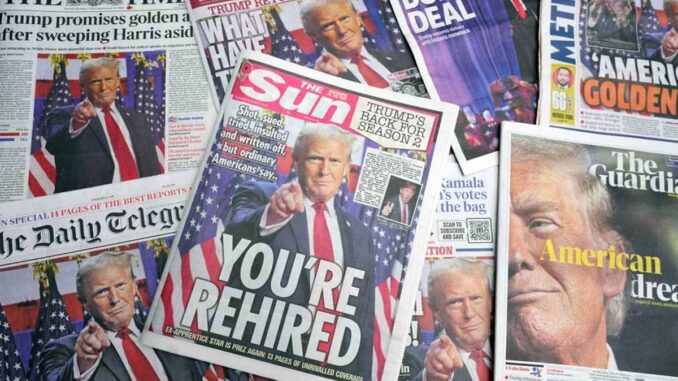
IN the realm of global climate policy, the leadership of the United States holds significant sway, given its status as the biggest historical greenhouse gas (GHG) emitter and a major player in international negotiations. As the 29th Session of the Conference of the Parties (COP29) to the United Nations Framework Convention on Climate Change continues to unfold in Baku, Azerbaijan, Donald Trump’s recent election as the 47th President of the United States adds a new layer of uncertainty and concern to the global climate agenda.
Britain’s newspapers’ front pages reporting on US President-elect Donald Trump in the US presidential election are seen in London on Nov. 7, 2024. PHOTO BY KIRSTY WIGGLESWORTH/AP
During his first term (2017–2021), Trump exhibited a stark skepticism toward climate science, famously labeling climate change a “hoax” as a supposed Chinese invention and withdrawing the US from the Paris Agreement. His views and actions have significant implications for international climate efforts, and his second presidency’s ramifications could be profound.
The Paris Agreement
One of the most immediate impacts would likely be a continued retreat from international climate commitments. Trump could undermine multilateral efforts by rejecting pending climate initiatives and agreements that countries may seek to establish.
His initial withdrawal from the Paris Agreement highlighted a reliance on national interests over global collaboration. A transcript of his announcement of said withdrawal was published on the White House website; then President Trump said: “In order to fulfill my solemn duty to protect America and its citizens, the United States will withdraw from the Paris Climate Accord.
“The United States will cease all implementation of the non-binding Paris Accord and the draconian financial and economic burdens the agreement imposes on our country. This includes ending the implementation of the Nationally Determined Contribution and, very importantly, the Green Climate Fund, which is costing the United States a vast fortune.”
In his debate with outgoing President Joe Biden in the CNN Presidential Debate last June 27, 2024, Trump said: “The Paris accord is going to cost us a trillion dollars, and China, nothing and Russia, nothing and India, nothing. It was a riff off the United States, and I ended it because I didn’t want to waste that money because they treat us horribly.”
This isolationist approach not only limits US participation in critical international discussions but could also embolden other nations to question their commitments to the Paris Agreement. The resulting domino effect may lead to a weakening of global readiness to tackle climate change collectively.
Trump’s first administration aggressively promoted fossil fuel production, characterized by deregulation, support for coal mining, and an expansion of oil and gas drilling. A second term could see a significant ramp-up of these policies, resulting in increased GHG emissions. Continued reliance on fossil fuels undermines the transition to renewable energy (RE) sources and could deter investments in cleaner technologies, shattering years of progress in combatting climate change.
Fossil fuel usage rebound
President-elect Trump, during his victory speech last Nov. 6, 2024, boasted of the US’ vast reserves of oil and natural gas. He told former environmental lawyer Robert F. Kennedy Jr., who suspended his own presidential campaign to support Trump, “… Leave the oil to me. We have more liquid gold, oil, and gas. We have more liquid gold than any country in the world. More than Saudi Arabia … More than Russia.”
To strengthen this, a controversial document, “2025: Mandate for Leadership, The Conservative Promise,” contains a series of policy proposals and strategic recommendations for a second Trump presidency. It promotes the continued development of the US fossil fuel industry, advocating for more oil, natural gas and coal production, as well as fewer restrictions around extraction and building new fossil fuel infrastructure.
The rebound in fossil fuel usage can adversely affect global efforts to maintain below 1.5 degrees Celsius of warming, substantially complicating the path to meeting the targets outlined in the Paris Agreement.
Domestic funding for climate research, programs and international climate aid would likely face significant cuts under a second Trump administration. The first Trump administration proposed slashing funding for climate science and programs aimed at mitigating climate change effects. Such funding is crucial for developing countries reliant on international support to address climate impacts and transition to RE resources.
Countries at greatest risk of climate change effects, such as those in the Global South, could find themselves grappling with even more limited support for resilience-building initiatives, adaptation measures and sustainable development projects that require external funding.
The absence of US leadership in climate policy can create a vacuum in global political will. As a key player in international climate negotiations, the US’ lack of commitment may lead other nations to hesitate in fulfilling their pledges or pursuing ambitious climate action. A second Trump presidency could weaken the resolve of countries striving for significant climate goals, ultimately resulting in insufficient action to address the climate crisis.
However, all will not be lost. The rules-based global order will persist, and the transition to clean energy worldwide cannot be halted. The climate movement will likely be more energized than ever. The US may find itself isolated as global climate cooperation extends beyond any one individual, including Trump.
The author is the founder and chief strategic advisor of the Young Environmental Forum and a director of Climate Tracker Asia Inc. He completed a climate change and development course at the University of East Anglia (United Kingdom) and an executive program on sustainability leadership at Yale University (USA). You can email him at [email protected].


Be the first to comment